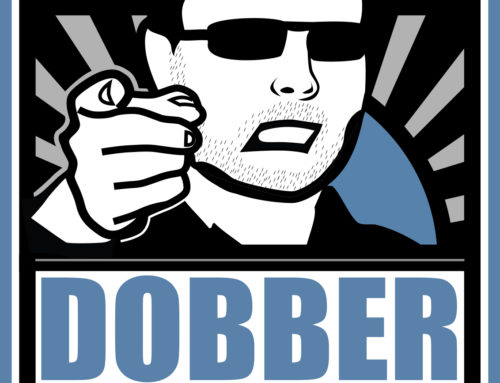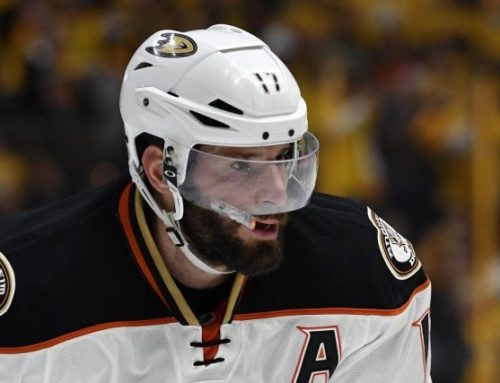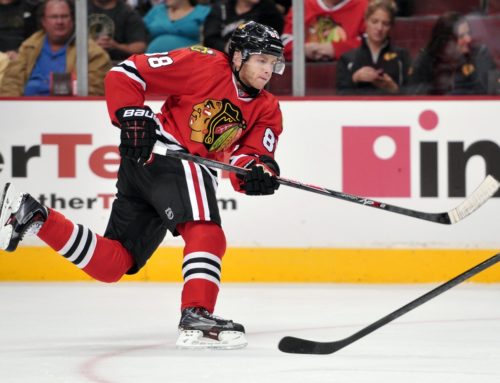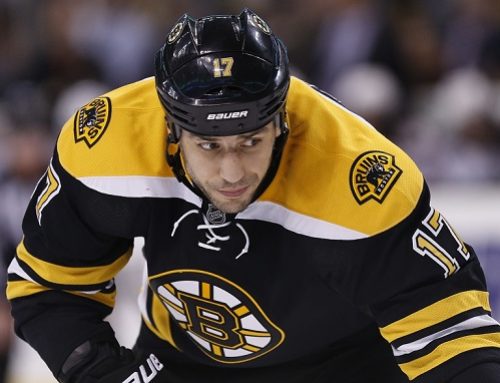
The duality of a goalie's first game is something I'll forever battle with internally. On the left side of my brain, it's merely a single game over the course of a seven-month season. On the right side, however, it's clearly the most important game in regards to their start. And that's when the battle ensues, as I must weigh the pros and cons of their success and failure to begin the regular season, and how that might affect their performances in the coming weeks.
The first game does one of two things. Either it establishes an early positive presence and creates more opportunities, or it slams the door shut on momentum and opens the door for the backup to get his early chance. Because of this, the result is much more important than save percentages and goals against averages, as it could set the tone for the entire season. Momentum is created or destroyed, good vibes are spread or evaporated, confidence is instilled or lost and the ability to post solid stats comes easier or harder (see Craig Anderson in October of 2009).
So no matter how right or wrong all of my summer predictions look just five days into the regular season, there's no way to combat the spontaneity of situation. This is where I really get frustrated, because once the puck drops, as we all know, anything can happen. And since there are still so many questions to be answered, it literally comes down to every single shot and save a goalie makes. I'm left to my own devices. I can only admit when I'm wrong, smile when I'm right and start dissecting trends.
Over the weekend, I discovered two goaltending trends. One was the impact of an early goal against and the other was the brutal ineffectiveness of the VHS save selection. VHS stands for Vertical-Horizontal Stance and is a common move goalies make when the puck is just below or above their goal line. Simply put, one pad goes horizontal along the ice and the other stays vertical along the post. This allows a goalie to have one leg underneath him, which improves and increases the speed and power of a lateral push across the crease to the opposite side.
Steve Mason's first goal against on Friday, Antero Niittymaki's first goal against on Saturday, Johan Hedberg's second goal against on Saturday and Marc-Andre Fleury's untimely goal against with 1:49 left in a 3-2 loss on Saturday were all a result of brutal VHS execution. Why has this happened so many times already? It's a sheer lack of timing and mechanics, the casual, complacent nature of the save, and finally, the shooter's pure skill. In most instances above, goalies were simply beat clean.
In my opinion, when a goalie is beat using the VHS from a sharp angle, it's a sign of weak situational awareness. Goalies thrive on muscle memory and routine, so the tendency to snap into the VHS is always there. But if the puck is more than two or three feet away from the crease, the goalie needs to recognize that standing up and conserving their energy and movements is the more effective move (or lack thereof). Movement causes holes to open up and that's the last thing a goalie wants.
The other dynamic plays a more pertinent role in the fantasy world. Early goals against over the last five days led to two different results. Either the goalie was unable to regain their momentum and they suffered a loss, or the goal forced them to focus at an even higher level, which led to big bounce-back saves and a winning performance. Early goals against are revealing because they ultimately lead goalies to feel the rope tighten around their neck, and then we're able to find out what they're really made of.
Steve Mason – Remember the School of Block lesson regarding Mason's struggles in the first and last five minutes of periods? Well, it only took 2:11 for the same trend to resurface. In Friday's game against San Jose, Mason's lack of mental preparation reared its ugly head on a simple wraparound goal by Torrey Mitchell. Before the game started, camera angles placed on Mason during the national anthems showed him looking aimlessly into the stands, his eyes darting back and forth to either side of the rink. It was a far cry from the usual stone-cold stare most focused goalies will have before the puck drops. And even though Mason improved as the game went on, Mason's brutal start was the difference in a crucial one-goal loss against Antti Niemi.
On Saturday, Mason once again allowed an early goal against, this one coming at 2:02 due to a seeing-eye shot from Joe Thornton. But the trend was reversed, as Mason was lights out after that early goal en route to 33 saves and being awarded the game's first star. Overall, Mason's weekend was another valuable lesson in mental preparation, but his owners should be excited knowing his stats should continue to improve over the next week compared to last season. These early goals against, however, could keep the Blue Jackets from winning a lot of one-goal games and making the playoffs.
Michal Neuvirth – His first game on Friday was stronger than the stats will show. Nobody really wanted to keep playing after Ondrej Pavelec slumped to the ice and was removed via stretcher. But the game continued and Neuvirth did a great job of showing mental toughness by staying focused through the first period. Atlanta turned on the jets in the second period thanks to some motivational words by Dustin Byfuglien and won the game 4-2 behind some terrific goaltending from Chris Mason. Only a successful Evander Kane penalty shot was considered weak, but 27 saves on 31 shots was still not the result I was hoping for.
Because Neuvirth was still very solid in that game, he was rewarded with consecutive starts on Saturday. He in turn rewarded his teammates with a brilliant second period. Once again, the early goal-against dynamic surfaced, as Neuvirth relinquished a terrible rebound while in the VHS and was beat just 1:49 into the game. But that forced his focus to elevate to a higher level, and when the game was tied 2-2 early in the second, Neuvirth displayed composure, confidence and stellar rebound control en route to 17-17 saves in the middle frame. That parlayed over into the third, where he stopped six more and 31 of 33 overall.
Semyon Varlamov is healthy enough to return to the lineup this week, so expect the dust to start lifting as this duel truly gets underway. Although the loss in Atlanta stings, I'm still quite confident in the Great Deceiver's fantasy value.
Kari Lehtonen – In two games, Kari proved what I've been saying for years: when he's healthy, he's elite. Yes, he allowed seven goals in two games, but when the Stars needed him the most, he was on fire. On Friday against the Devils, he allowed an early goal just 2:45 into the game and then another even-strength tally at 7:13. But after that, he snapped into focus, got into a rhythm and led the Stars to victory. Jason Arnott ripped the twine behind him on a power play goal at 10:22 of the middle frame, but after that, Lehtonen stopped everything in a scoreless, lop-sided third period (shots were 13-4 for NJ) and stopped one shot in OT before Loui Eriksson beat Martin Brodeur up high for the shocking 4-3 come-from-behind win.
On Saturday against the Islanders, Lehtonen stopped all 13 shots in the first period and then allowed two power play goals in the second period on 10 total shots. In the third, the Islanders poured a colossal 23 shots on goal and scored the game-tying power play goal with just 2:39 remaining. But once again, Lehtonen came up huge in OT and stopped all three shootout shots en route to a 5-4 win. In two games, Lehtonen has a .909 save percentage and 3.33 GAA. Four of the seven goals he has allowed have come on the power play and he's already faced 77 total shots.
Pascal Leclaire – Although you can't blame him for either defeat over the weekend, the eight goals he has allowed reflects the same dynamic as last year. He's still way too acrobatic, relies way too much on his reactions and not nearly enough on solid positioning and staying square to the puck. Until his footwork is minimalized, he will continue to give up big rebounds and get caught moving laterally on second and third opportunities. Fantasy managers wonder why Leclaire is so often injured and the answer is simple: he's caught scrambling too often and is forced to make desperate saves in vulnerable positions. I hate to say it, but I still think it's a matter of time before he suffers some kind of injury. And after two straight losses, Brian Elliott will surely get his chance to notch the team's first win on Monday against the Capitals.
Tim Thomas – It doesn't really matter if Boston played ten times better in front of their goaltender on Sunday compared to Saturday. Thomas stopped all 29 shots thrown his way – Tuukka Rask, albeit very good in the 5-2 loss – did not. Therefore the crucial early-season advantage goes to Thomas, who once again looks like he's thriving in the unconventional style that makes him such a fierce warrior, energetic leader and tremendous battler.
Henrik Lundqvist – Did you see the second goal he allowed against the Sabres on Saturday? A shot from the point found its way through traffic and beat him five-hole. The goalie with the longest thigh rises in the league last year had to shrink them from five inches to three, and it only took one game for the Limiting Distance Size to have an impact. I didn't see the game on TV, so I can't speak for his depth in the crease, but I will certainly watch him this week to see if he's coming off the goal line at all.
Waiver Wire Alert – With Pavelec on the IR and Rinne considered 'day-to-day', Anders Lindback and Chris Mason are direct beneficiaries. Drew MacIntyre was recalled to Atlanta but isn't worth picking up, but Lindback's size and potential makes him a solid snag off the wire. Chris Osgood looked very confident and played above the blue paint against Chicago and won his 397th career game. Even though Jimmy Howard pitched a shutout in his first game, the Red Wings know Osgood is closing in on a milestone and as long as he continues to play well, should get a few more starts this month. Finally, Thomas Greiss was placed on waivers Sunday morning and since Rinne's injury isn't considered serious, will probably slide on through to Worcester.





 EDM
EDM FLA
FLA DAL
DAL CHI
CHI OTT
OTT STL
STL L.A
L.A ANA
ANA CBJ
CBJ CAR
CAR
